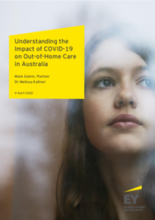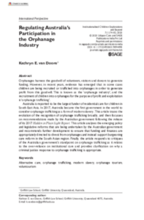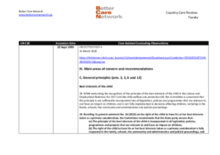

Displaying 201 - 210 of 677
This report presents a review of published literature and consultation with current foster and kinship carers to examine impacts of COVID-19 on OOHC, highlighting the likelihood of increased service strain.
This paper utilises data generated through an ‘empowerment group’ for care‐experienced young people; it illustrates how an ecological understanding of agency, as a heuristic, might further understanding of the lives of care‐experienced young people.
In this article, the authors draw on case study data from the Australian Baby Makes 3 (BM3) programme to explore factors that promote father engagement in parenting support programmes.
This article, an auto-ethnographic collaboration between a social work professional and two care leavers, aims to address the problems with records compiled by care workers, social workers and other relevant personnel by constructing a ‘virtual archive’ consisting of several hypothetical records compiled in the style typically employed by caseworkers, which are then critiqued by the care leavers.
This paper explores the experiences of Victorian foster and kinship carers accessing timely health assessment and ongoing healthcare for a child placed in their care; identifying barriers and enablers.
This paper explores the experiences of Victorian foster and kinship carers accessing timely health assessment and ongoing healthcare for a child placed in their care; identifying barriers and enablers.
This article traces the evolution of the recognition of orphanage trafficking broadly, and then focusses on recommendations made by the Australian government following the release of its 2017 Hidden in Plain Sight Report.
This paper presents a participatory research study that explored the experiences of a group of Aboriginal Australian parents who have had their children removed by child protection authorities in one Australian state, New South Wales.
This country care review includes the Concluding Observations of the Committee on the Rights of the Child.
This article argues that child protection agencies must provide mandatory training about the Aboriginal experience within the welfare state and the resultant trauma that exists in Australian Indigenous communities.



